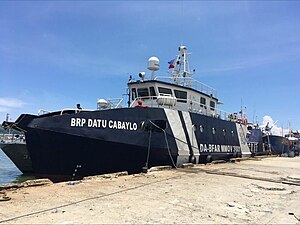BRP Datu Cabaylo (MMOV-3001) (also known as DA-BFAR MMOV-3001) is the lead ship of a new class of 30-meter multi-mission offshore civilian patrol vessels operated by the Philippine government's Bureau of Fisheries and Aquatic Resources.[1] The ship was built by Josefa Slipways, Inc. in Sual, Pangasinan using a design from Australian ship designer Incat Crowther, and was launched on 14 June 2022.[1] It was commissioned in the later part of 2022. Its intended mission is to guard Philippine waters against illegal fishing, maritime protection and fisheries control, with secondary mission of supporting law enforcement agencies like the Philippine Coast Guard in patrolling Philippine territorial waters and Exclusive Economic Zones.

| |
| History | |
|---|---|
| Name | BRP Datu Cabaylo |
| Namesake | Datu Cabaylo, last datu of the Kingdom of Taytay |
| Operator | Bureau of Fisheries and Aquatic Resources |
| Ordered | 2020 |
| Builder | Josefa Slipways Inc., Sual, Pangasinan, Philippines |
| Launched | 14 June 2022 |
| Identification | Hull number: MMOV-3001 |
| Status | undergoing fit-out works as of June 2022 |
| General characteristics | |
| Class and type | Datu Cabaylo-class multi mission offshore vessel |
| Length | 30.0 m (98 ft) |
| Propulsion | 2 × diesel engine |
Conflict
editOn October 8, 2024, the People's Liberation Army Navy warship and China Coast Guard cutter 3301 along Scarborough Shoal fired water cannons at BRP Datu Cabaylo and BRP Datu Sanday (MMOV-3002), both deployed to resupply Filipino fishermen with fuel, food and medicine.[2] On October 11, a Chinese militia vessel with bow number 00108 along Pag-asa (Sandy) Cay 4 deliberately sideswiped and collided with Datu Cabaylo at its starboard bow.[3]
References
edit- ^ a b "Josefa Slipway launches new multi-mission offshore vessel". Manila Times. 2022-06-22. Retrieved 2022-11-16.
- ^ Cruz, Marinel (June 16, 2012). "Willie longs for time with his four children". Philippine Daily Inquirer. Retrieved October 15, 2024.
- ^ Lariosa, Aaron (October 8, 2024). "China Coast Guard Blasts Philippine Fisheries Vessel at Scarborough Shoal". United States Naval Institute. Retrieved October 15, 2024.